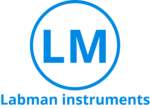Laboratory water purification systems
Premium Neptec HALIOS & TRITON Laboratory Water Systems — Modular and Intuitive
Labman Instruments is the official distributor of Neptec GmbH laboratory water purification systems. Proudly made in Germany, Neptec products combine exceptional quality with cost-effective pricing, making them ideal for laboratories seeking reliable and precise water purification solutions.
Our range of lab water systems meets the highest international standards and includes solutions for:
Type 3 Water – Reverse Osmosis (RO) water for general lab use
Type 2 Water – Pure water for standard laboratory applications
Type 1 Water – Ultrapure water for analytical and molecular biology work
CLRW (Clinical Laboratory Reagent Water) – For clinical diagnostics
Demineralised (Demi) Water – For non-critical applications
Whether you’re setting up a new lab or upgrading your existing system, Labman provides expert advice and full support to help you select the right Neptec system for your needs.
Combo systems
Combo systems deliver ASTM type 1 ultrapure water in combination with ASTM type 2 pure or ASTM type 3 reverse osmosis water. They are ideal when you need 1 devise for all your lab water needs.
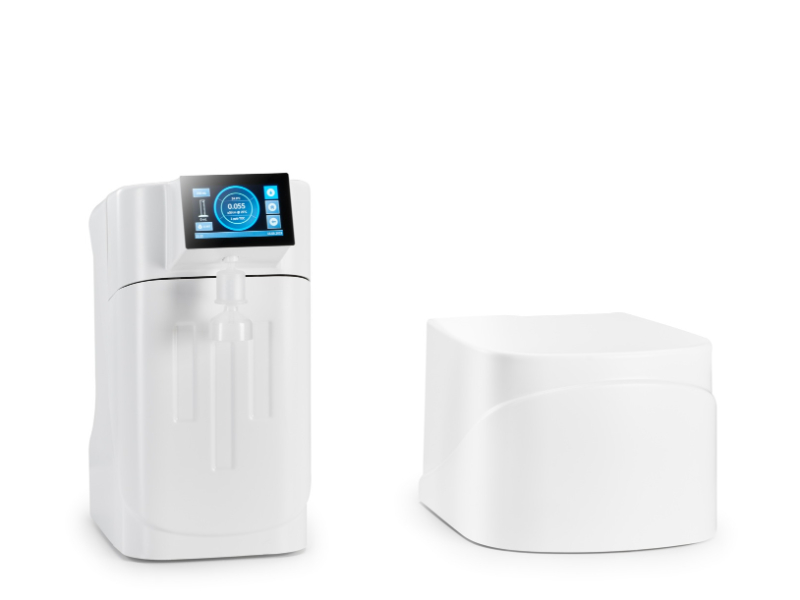
- Product: Type 1 +2 from tap water
- Dispense rate: 2 L/min
- Type 2 production rate: 6 L/h at 10°C, 8 L/h at 20°C
- Storage: Type 2: 10 L storage tank
- Dispenser: non-telescopic, attached
€6.768,00 Original price was: €6.768,00.€6.091,20Current price is: €6.091,20. excl. VAT

- Product: Type 1 + 2 from tap water
- Dispense rate: 2 L/min
- Type 2 production rate: 12 L/h at 10°C, 16 L/h at 20°C
- Storage: Type 2: 10 L storage tank
- Dispenser: non-telescopic, attached
€7.080,00 Original price was: €7.080,00.€6.372,00Current price is: €6.372,00. excl. VAT

- Product: Type 1 + 3 from tap water
- Dispense rate: 2 L/min
- Type 3 production rate: 6 L/h at 10°C, 8 L/h at 20°C
- Storage: Type 3: 10 L tank
- Dispenser: non-telescopic, attached
€6.768,00 excl. VAT

- Product: type 1 + 3 from tap water
- Dispense rate: 2 L/min
- Type 3 production rate: 12 L/h at 10°C, 15 L/h at 20°C
- Storage: Type 3: 10 L tank
- Dispenser: non-telescopic, attached
€7.080,00 excl. VAT

- Product: Type 1 + 2 from tap water
- Dispense rate: 2 L/min
- Type 2 production rate: 6 L/h at 10°C, 8 L/h at 20°C
- Storage: Type 2: 10 L storage tank
- Dispenser: integrated telescopic dispenser
€8.316,00 excl. VAT

- Product: Type 1 + 2 from tap water
- Dispense rate: 2 L/min
- Type 2 production rate: 12 L/h at 10°C, 15 L/h at 20°C
- Storage: Type 2: 10 L storage tank, optional 50L
- Dispenser: integrated telescopic dispenser
€8.695,00 excl. VAT

- Product: Type 1 ultrapure water + Type 2 pure water
- Feed: tap/domestic water
- Dispense rate: 2 L/min
- Type 2 production rate: 6 L/h at 10°C, 8 L/h at 20°C
- Storage: Type 2: 10 L storage tank
- Dispenser: benchtop telescopic dispenser
€8.965,00 excl. VAT

- Product: Type 1 + 2 from tap water
- Dispense rate: 2 L/min
- Type 2 production rate: 12 L/h at 10°C, 15 L/h at 20°C
- Storage: Type 2: 10 L storage tank, optional 50L
- Dispenser: benchtop telescopic dispenser
€9.345,00 excl. VAT
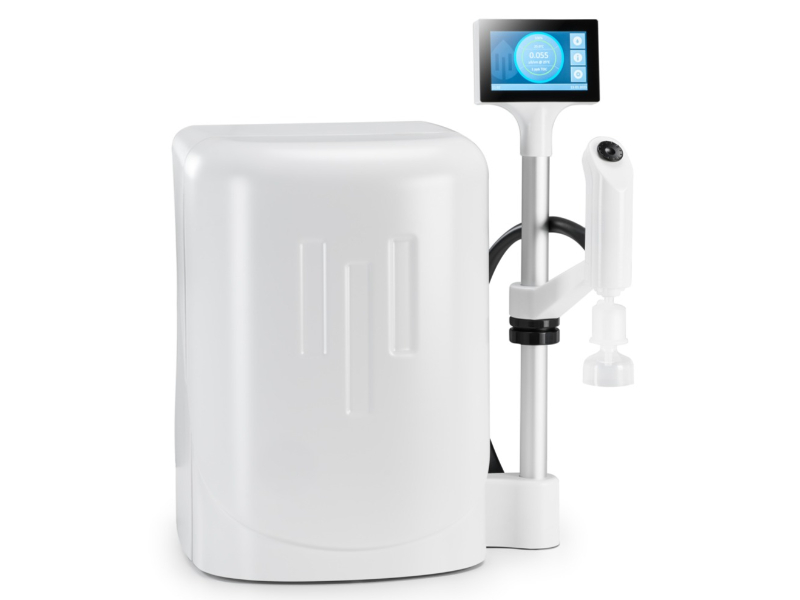
- Product: Type 1 + 2 from tap water
- Dispense rate: 2 L/min
- Type 2 production rate: 40 L/h at 10°C
- Storage: Type 2: 50 L storage tank with dispensing gun
- Dispenser: integrated telescopic dispenser
€9.825,00 excl. VAT
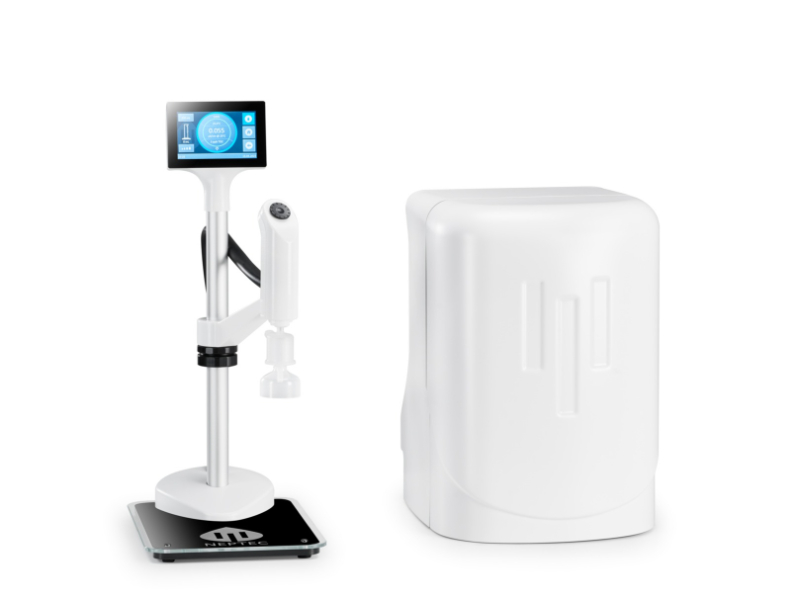
- Product: Type 1+ 2 from tap water
- Dispense rate: 2 L/min
- Type 2 production rate: 40 L/h at 10°C
- Storage: Type 2: 50 L storage tank with dispensing gun
- Dispenser: benchtop telescopic dispenser
€10.485,00 excl. VAT
Ultrapure water systems
Ultrapure water systems produce ASTM type 1 water with a resistivity of 18.2 MΩ.cm, TOC < 10 ppb and bacterial count <10 CFU/ml. Ultrapure water is typically used for applications which require very low contamination levels like HPLC, cell culture and mass spectrometry. When starting from tap water, the first production steps also involve reverse osmosis. That’s why systems producing ultrapure water from tap water are in most cases combo systems (see products above). When the feed water for the instrument is already purified (ASTM type 3 reverse osmosis, ASTM type 2 pure or distillated water), a device with a shortened production process can be used (often called polishers). Ultrapure water is typically produced on-demand, so is never stored in a tank.
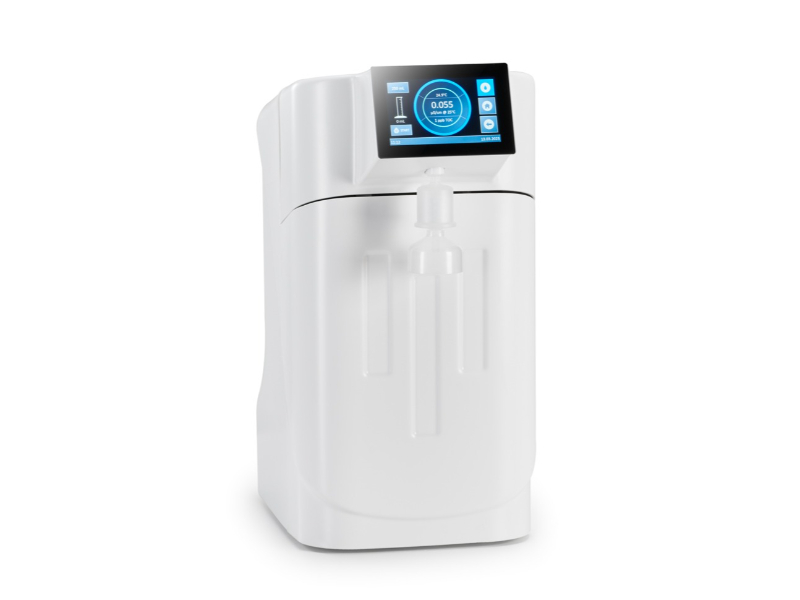
- Product: Type 1 ultrapure water
- Feed: type 3 RO, type 2 pure or distillated water
- Dispense rate: 2 L/min
- Storage: production on demand, no tank
- Dispenser: non-telescopic, attached
€5.520,00 Original price was: €5.520,00.€4.968,00Current price is: €4.968,00. excl. VAT

- Product: type 1 ultrapure water
- Feed: type 3 RO, type 2 pure or distillated water
- Dispense: 2 L/min
- Storage: production on demand, no tank
- Dispenser: integrated telescopic dispenser
€6.948,00 excl. VAT

- Product: type 1 ultrapure water
- Feed: type 3 RO, type 2 pure or distillated water
- Dispense rate: 2 L/min
- Storage: production on demand, no tank
- Dispenser: benchtop telescopic dispenser
€7.595,00 excl. VAT
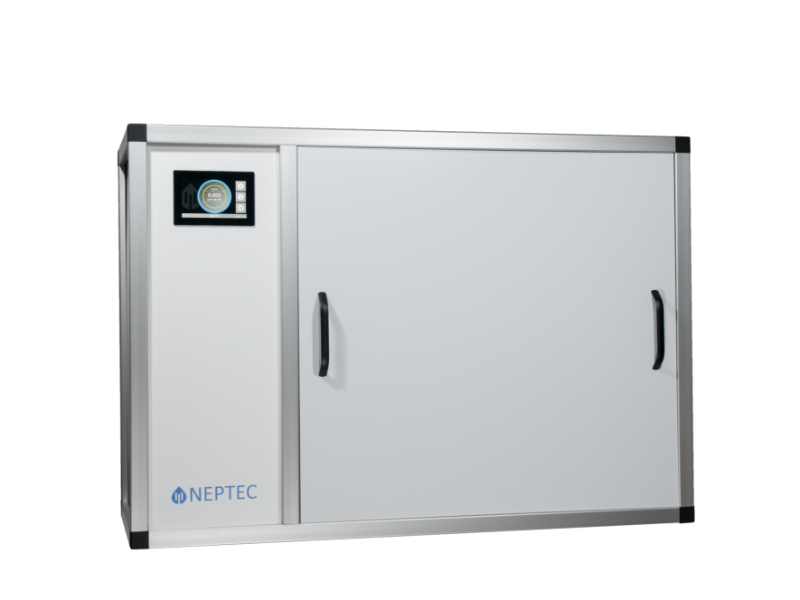
- Product: Type 1 ultrapure water
- Feed: type 3 RO, type 2 pure or distillated water
- Dispense rate: 10 L/min
- Storage: production on demand, no tank
- Dispenser: dispensing gun
€9.840,00 excl. VAT
Reverse osmosis systems
ASTM type 3 reverse osmosis water is often used for general lab applications like glassware rinsing, laboratory dishwashers, autoclaves/ steam sterilizers, climate chambers, water baths, … Often reverse osmosis water is also used to feed ultrapure water systems / polishers. The production unit stores the reverse osmosis water in a suitable tank for intermediate storage. Often when a direct connection with pressurized reverse osmosis is required (for example for laboratory dishwasher, autoclaves,…) a booster pump is required.

- Product: Type 3 Reverse Osmosis water
- Feed: tap/domestic water
- Type 3 production rate: 40 L/h
- Storage: tank not included, different tank options
- Pump: not included
€4.740,00 excl. VAT

- Product: Type 3 Reverse Osmosis from tap water
- Dispense rate: 2 L/min
- Type 3 production rate: 6 L/h at 10°C, 8 L/h at 20°C
- Storage: type 3: 10 L storage tank
- Dispenser: non-telescopic, attached
€5.135,00 excl. VAT

- Product: Type 3 Reverse Osmosis water from tap water
- Dispense rate: 2 L/min
- Type 3 production rate: 12 L/h at 10°C, 15 L/h at 20°C
- Storage: type 3: 10 L storage tank. 50 L optional
- Dispenser: non-telescopic, attached
€5.445,00 excl. VAT

- Product: type 3 reverse osmosis water
- Feed: tap/domestic water
- Type 3 production rate: 40 L/h
- Storage: integrated 80 L storage tank
- Pump: frequency controlled booster pump
€7.710,00 excl. VAT
DI water system and EDI water systems
DI and EDI water systems (ASTM type 2 pure water) cover a lot of the same applications as reverse osmosis water, but involves an even more advanced purification to cover more applications like pH solutions, buffers, microbiological culture media and clinical analyzer feeding.

- Product: Type 2 electro deionized water
- Feed: tap/domestic water
- Type 2 production rate: 40 L/h
- Storage: tank not included, different tank options
- Pump: not included
€8.079,00 excl. VAT

- Product: type 2 pure water
- Feed: tap/domestic water
- Type 2 production rate: 40 L/h
- Storage: integrated 80 L storage tank
- Pump: frequency controlled booster pump
€11.049,00 excl. VAT
Central water systems
Central water systems are the preferred solution when larger volumes are needed, or when the device needs to feed a central loop in a building. Central systems are constructed of industrial grade components, which allow 24/7 production without any issue. Central systems can be configured as ASTM type 3 reverse osmosis systems or as type 2 pure water systems (by electro deionization/EDI).

- Product: type 3 reverse osmosis water
- Feed: tap/domestic water
- Type 3 production: 60, 180, 350, 500, 900 or 1200 L/h
- Storage: optional 160 L integrated tank
- Pump: frequency controlled booster pump 3 m³/h
Price on request

- Product: type 2 pure water (through RO-EDI)
- Feed: tap/domestic water
- Type 2 production rate: 60, 180, 350 or 500 L/h
- Storage: optional 160 L integrated tank
- Pump: frequency controlled booster pump 3 m³/h
Price on request
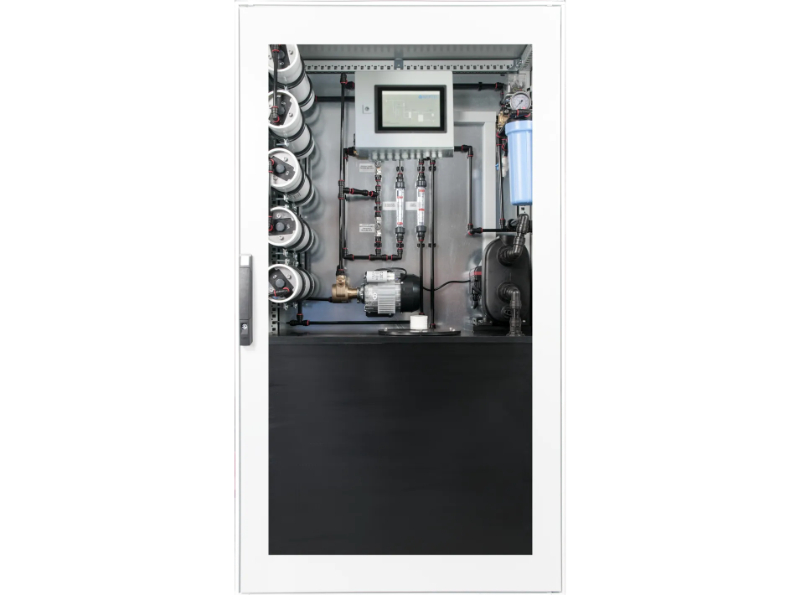
- Product: type 3 reverse osmosis water
- Feed: tap/domestic water
- Type 3 production rate: 60, 180, 350 or 500 L/h
- Storage: optional 300 L integrated tank
- Pump: frequency controlled booster pump 3 m³/h
Price on request

- Product: type 2 pure water (through RO-EDI)
- Feed: tap/domestic water
- Type 2 production rate: 60, 180, 350 or 500 L/h
- Storage: optional 300 L integrated tank
- Pump: frequency controlled booster pump 3 m³/h
Price on request
Ion Exchangers
Ion Exchangers use cartridges of mixed bed ion exchange resin to demineralize water (demiwater). They are an economical alternative to reverse osmosis or pure water when ion removal as a sole parameter is sufficient.

- Product: demineralized water 0,1 – 20 µS/cm
- Feed: tap water
- Production speed: 500 L/h
- Production capacity in L at 300 µS/cm: 2500 L
- Connection: 3/4″
€870,00 excl. VAT

- Product: demineralized water 0,1 – 20 µS/cm
- Feed: tap water
- Production speed: 600 L/h
- Production capacity in L at 300 µS/cm: 2800 L
- Connection: 3/4″
€1.005,00 excl. VAT

- Product: demineralized water 0,1 – 20 µS/cm
- Feed: tap water
- Production speed: 1000 L/h
- Production capacity in L at 300 µS/cm: 3600 L
- Connection: 3/4″
€1.285,00 excl. VAT

- Product: demineralized water 0,1 – 20 µS/cm
- Feed: tap water
- Production speed: 1800 L/h
- Production capacity in L at 300 µS/cm: 6000 L
- Connection: 3/4″
€1.955,00 excl. VAT
Frequently asked questions
What is a laboratory water purification system?
A laboratory water purification system is a device that removes contaminants from tap water to produce purified water suitable for lab applications. These systems ensure consistent water quality for use in chemical analysis, life sciences, clinical diagnostics, and general laboratory work
What is the difference between ultrapure, pure and reverse osmosis?
These water types differ in their purity and their applications.
Ultrapure water (also called type 1 or reagent grade water) is the purest water. Ultrapure water is typically used for critical applications like HPLC, ICP, MS, AA, molecular biology and mammalian cell culture.
Pure water (also called type 2, analytical grade, DI or EDI water) is used for standard applications like buffers, pH solutions, bacterial cell culture and clinical analyzers. Pure water can also be used for a lot of the same applications as reverse osmosis water.
Reverse osmosis water (also called type 3, laboratory grade, or RO water) is used for general applications like glassware rinsing, laboratory dishwashers, autoclaves and water baths.
What lab water system do I need for my application?
To chose the best system for your lab water needs, there are a few considerations:
- What applications need laboratory water?
- What water quality is needed for each of the applications?
- How much of each lab water type is needed each day/week/month?
- What is the feed water quality? (Tap water, reverse osmosis water, DI water, EDI water,…)
- How much water is needed per hour, per day or week?
- What are the ambient conditions? Does the lab water system need to be benchtop, wall-mounted, undercounter or free standing?
- Are there any regulatory requirements for the installation? (For example IQ OQ)
With this info, Labman can support you in finding the best solution for your lab water needs.
Can lab water systems be connected to existing lab equipment or automation platforms?
Lab water systems like reverse osmosis or DI water systems produce water that is stored in a pure water tank. Sometimes direct connection to an instrument like a laboratory dishwasher, autoclave (steam sterilizer) or a climatic chamber is required. These instruments need a certain feed water pressure to work optimally. Booster pumps can be connected to the pure water tank to pressurize pure water to the required feed water pressure for the lab equipment.
Labman offers variable frequency booster pumps suitable for the use in laboratories. Also discover our all-in-one undercounter Proteus systems including integrated 80L pure water tank and booster pump.
What is better: DI water or EDI water?
Lab DI water systems use a deionization cartridge on top of the pre-filtration and reverse osmosis step. The deionization cartridge is filled with single use mixed bed resin to further demineralize the water after the reverse osmosis step. Mixed bed resin (a mix of anion exchange resin and cation exchange resin) has the advantage of being a relatively simple and cheap technology. The resin gets saturated, which means the cartridge is typically replaced every year.
Sometimes DI water also refers to ion exchangers, which use mixed bed resin without prefiltration or reverse osmosis. Ion exchangers are a very different technology.
Lab EDI water systems use an electro deionization module to demineralize the water after the reverse osmosis step. Electro deionization uses mixed bed resin in combination with semi permeable membranes and electrodes. The main advantage of EDI vs. DI is that it is a continuous system (self regenerating), which means there is no consumable cost. The disadvantage is that EDI is an expensive technology. EDI is also sensitive to scaling, which means that in most cases softened feed water is required.
In general DI water systems are more interesting for laboratories with lower lab water consumption and EDI water systems are more interesting for laboratories with a high lab water consumption.
Why is high-purity water important in laboratories?
Impurities in lab water can affect test results, damage instruments, and lead to failed experiments. Using the correct purity level ensures accuracy, reliability, and compliance with quality standards.
What is CLRW water and when is it required?
CLRW (Clinical Laboratory Reagent Water) is the standard for water used in clinical diagnostics. It is required for lab tests where precision is critical, ensuring minimal interference from impurities.
Are Neptec lab water systems compliant with international standards
Yes. Neptec GmbH water systems meet international lab water quality standards including:
ASTM Type I, II, III
ISO 3696 Grades 1–3
CLSI CLRW for clinical applications
All systems are manufactured in Germany to the highest engineering standards.
